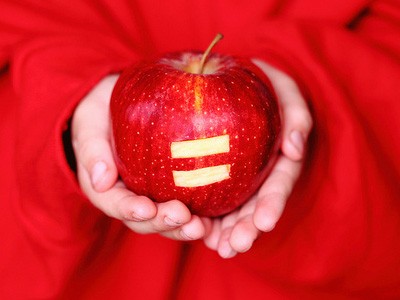Teaching children by example

An excerpt from the article "Buddhism in Modern Society" from The Path to Happiness
Dharma practice isn’t just coming to the temple; it’s not simply reading a Buddhist scripture or chanting the Buddha’s name. Practice is how we live our lives, how we live with our family, how we work together with our colleagues, how we relate to the other people in the country and on the planet. We need to bring the Buddha’s teachings on loving-kindness into our workplace, into our family, even into the grocery store and the gym. We do this not by handing out leaflets on a street corner, but by practicing and living the Dharma ourselves. When we do, automatically we will have a positive influence on the people around us. For example, you teach your children loving-kindness, forgiveness, and patience not only by telling them, but by showing it in your own behavior. If you tell your children one thing, but act in the opposite way, they are going to follow what we do, not what we say.
If we’re not careful, it is easy to teach our children to hate and never to forgive when others harm them. Look at the situation in the former Yugoslavia: it is a good example of how, both in the family and in the schools, adults taught children to hate. When those children grew up, they taught their children to hate. Generation after generation, this went on, and look what happened. There is so much suffering there; it’s very sad. Sometimes you may teach children to hate another part of the family. Maybe your grandparents quarreled with their brothers and sisters, and since then the different sides of the family didn’t speak to each other. Something happened years before you were born—you don’t even know what the event was—but because of it, you’re not supposed to speak to certain relatives. Then you teach that to your children and grandchildren. They learn that the solution to quarreling with someone is never to speak to them again. Is that going to help them to be happy and kind people? You should think deeply about this and make sure you teach your children only what is valuable.
This is why it’s so important that you exemplify in your behavior what you want your children to learn. When you find resentment, anger, grudges, or belligerence in your heart, you have to work on those, not only for your own inner peace but so you don’t teach your children to have those harmful emotions. Because you love your children, try to also love yourself as well. Loving yourself and wanting yourself to be happy means you develop a kind heart for the benefit of everybody in the family.
Bringing loving-kindness to the school
We need to bring loving-kindness not only into the family, but also into the schools. Before I became a nun, I was a schoolteacher, so I have especially strong feelings about this. The most important thing for children to learn is not a lot of information, but how to be kind human beings and how to resolve their conflicts with others in a constructive way. Parents and teachers put a lot of time and money into teaching children science, arithmetic, literature, geography, geology, and computers. But do we ever spend any time teaching them how to be kind? Do we have any courses in kindness? Do we teach kids how to work with their own negative emotions and how to resolve conflicts with others? I think this is much more important than the academic subjects. Why? Children may know a lot, but if they grow up to be unkind, resentful, or greedy adults, their lives will not be happy.
Parents want their children to have a good future and thus think their children need to make a lot of money. They teach their children academic and technical skills so that they can get a good job and make lots of money—as if money were the cause of happiness. But when people are on their deathbed, you never hear anybody wishfully say, “I should have spent more time in the office. I should have made more money.” When people have regrets about how they lived their life, usually they regret not communicating better with other people, not being kinder, not letting the people that they care about know that they care. If you want your kids to have a good future, don’t teach them just how to make money, but how to live a healthy life, how to be a happy person, how to contribute to society in a productive way.
Teaching children to share with others
As parents, you have to model this. Let’s say your children come home and say, “Mom and Dad, I want designer jeans, I want new rollerblades, I want this and I want that, because all the other kids have it.” You say to your children, “Those things won’t make you happy. You don’t need them. It won’t make you happy to keep up with the Lee’s.” But then you go out and buy all the things that everybody else has, even though your house is already filled with things you don’t use. In this case, what you are saying and what you are doing are contradictory. You tell your children to share with other children, you don’t give things to charities for the poor and needy. Look at the homes in this country: they are filled with things we don’t use but can’t give away. Why not? We’re afraid that if we give something away, we might need it in the future. We find it difficult to share our things, but we teach children that they should share. A simple way to teach your children generosity is to give away all the things you haven’t used in the last year. If all four seasons have gone by and we haven’t used something, we probably won’t use it the next year either. There are many people who are poor and can use those things, and it would help ourselves, our children, and the other people if we gave those things away.
Another way to teach your children kindness is to not buy everything that you want. Instead, save the money and give it to a charity or to somebody who is in need. You can show your children through your own example that accumulating more and more material things doesn’t bring happiness, and that it’s more important to share with others.
Teaching children about the environment and recycling
Along this line, we need to teach children about the environment and recycling. Taking care of the environment that we share with other living beings is part of the practice of loving kindness. If we destroy the environment, we harm others. For example, if we use a lot of disposable things and don’t recycle them but just throw them away, what are we giving to future generations? They will inherit from us bigger garbage dumps. I’m very happy to see more people reusing and recycling things. It is an important part of our Buddhist practice and an activity that temples and Dharma centers should take the lead in.
Venerable Thubten Chodron
Venerable Chodron emphasizes the practical application of Buddha’s teachings in our daily lives and is especially skilled at explaining them in ways easily understood and practiced by Westerners. She is well known for her warm, humorous, and lucid teachings. She was ordained as a Buddhist nun in 1977 by Kyabje Ling Rinpoche in Dharamsala, India, and in 1986 she received bhikshuni (full) ordination in Taiwan. Read her full bio.


